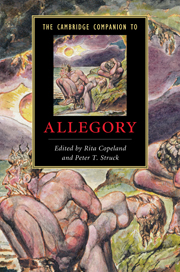Book contents
- Frontmatter
- Introduction
- Part I: Ancient foundations
- 1 Early Greek allegory
- 2 Hellenistic allegory and early imperial rhetoric
- 3 Origen as theorist of allegory: Alexandrian contexts
- Part II: Philosophy, theology, and poetry 200 to 1200
- Part III: Literary allegory: philosophy and figuration
- Part IV: The fall and rise of allegory
- Further reading
- Index
3 - Origen as theorist of allegory: Alexandrian contexts
from Part I: - Ancient foundations
Published online by Cambridge University Press: 28 January 2011
- Frontmatter
- Introduction
- Part I: Ancient foundations
- 1 Early Greek allegory
- 2 Hellenistic allegory and early imperial rhetoric
- 3 Origen as theorist of allegory: Alexandrian contexts
- Part II: Philosophy, theology, and poetry 200 to 1200
- Part III: Literary allegory: philosophy and figuration
- Part IV: The fall and rise of allegory
- Further reading
- Index
Summary
Within an early Christian context, one finds allegory judged by at least two quite different measures. It is, on the one hand, the powerful engine of Pauline reinterpretation that makes the Hebrew Bible into an “old” testament. On the other, it is a non-literal way of reading that raises a certain anxiety within a set of traditions that at regular intervals insist on different forms of literalism. Both kinds of measures are regularly applied to the vast corpus of Origen (185-c. 254), the formative thinker of early Christian allegorical exegesis. Among the anxieties that his non-literal interpretations have raised is that he too quickly abandons the literal sense of a text and is more informed by the spirit of Platonism than by the Scriptural letter. Frequently we even find him described as if a prior commitment to Platonic philosophy drove his theological enterprise and thus “distorted” his Christian theology, as well as his interpretative practice. This aspect of Origen's work highlights the transition of allegory from a pagan practice of interpreting difficult passages in Homer and Hesiod to a foundational piece of an emerging Christian biblical hermeneutics. I would now propose that we think of this consequential relationship between Plato and Origen differently, in nearly opposite fashion: Platonism provided a framework within which Origen could think about the question of how we interpret; and Christian Logos theology, the notion of Christ as the incarnation of the Word, provided a solution to problems left unsolved by Platonism, precisely in that crucial area of epistemological theory, as well.
- Type
- Chapter
- Information
- The Cambridge Companion to Allegory , pp. 39 - 54Publisher: Cambridge University PressPrint publication year: 2010
- 5
- Cited by



